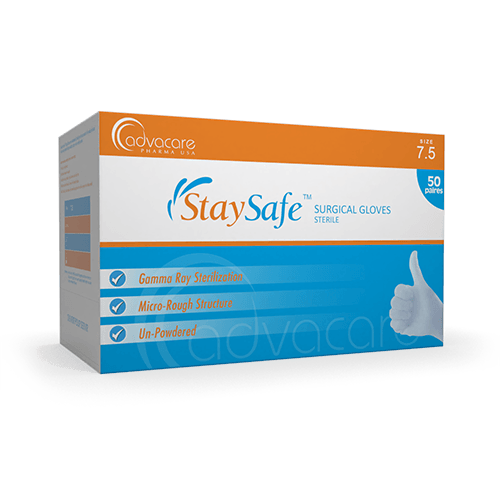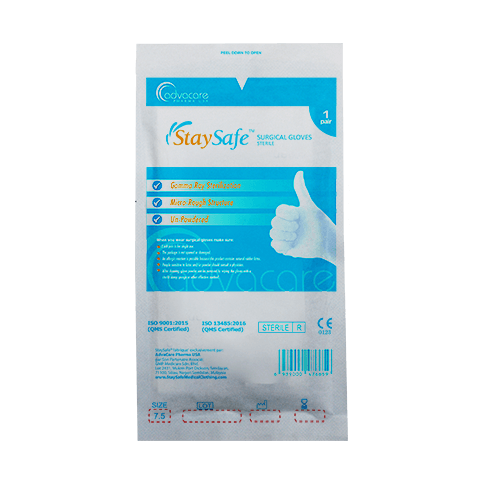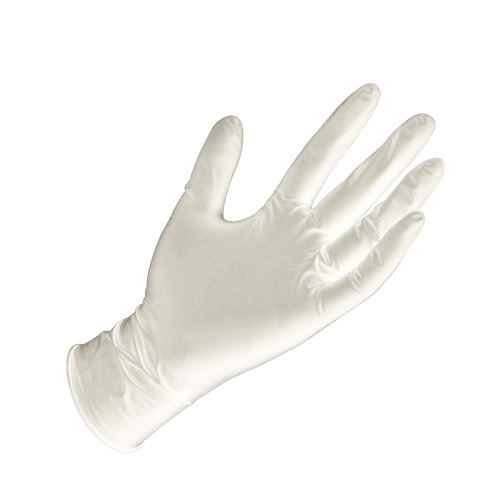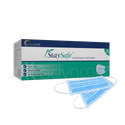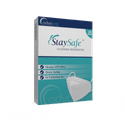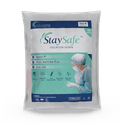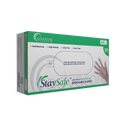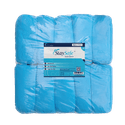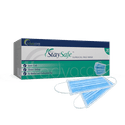- Home›
- Medical Devices›
- Medical Disposables›
- Personal Protective Equipment (PPE)›
- Surgical Gloves
Surgical Gloves
Material
Surface
Texture
Size
Packaging
What are Surgical Gloves?
Surgical Gloves are single-use protective gloves used to prevent cross-contamination between healthcare professionals and patients during a procedure. Gloves help prevent direct contact with blood, bodily fluids, and other substances and are often worn in medical settings like exam rooms or emergency departments.
Disposable surgical gloves are produced in different polymers including latex, nitrile rubber, and polyisoprene. They are available in a wide range of sizes, from 6.0 to 8.5, as precise sizing is essential for the precision and sensitivity necessary for these types of procedures.
Surgical Gloves are manufactured by AdvaCare Pharma, an American-owned pharmaceutical company with extensive experience in worldwide distribution. These medical-grade surgical gloves are produced in CE/ISO-certified facilities, where regular inspections guarantee that our facilities and our products meet stringent health, safety, and environmental standards.
Product Specifications
Material
Surface
Texture
Latex
Latex surgical gloves offer exceptional elasticity, which allows for a comfortable fit and conformity to the hand shape. Latex gloves offer an elongation limit of approximately 750% and exhibit remarkable flexibility and stretchability. They provide reliable protection against punctures, as well as chemical and pathogen exposure.
It should be noted that orthopedic gloves offer the highest level of protection, followed by standard latex gloves, and finally, latex microsurgery gloves, which are recommended for low-risk procedures.
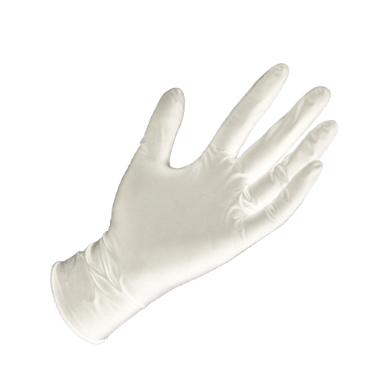
Nitrile
Nitrile surgical gloves are made from high-quality synthetic polymers, a material that offers superior resistance to punctures and corrosive or irritable chemicals. Unlike latex gloves, nitrile gloves are less likely to cause allergic reactions or skin irritation, making them a suitable alternative for individuals with latex allergies.
Nitrile surgical gloves provide reliable protection while maintaining a high level of comfort and dexterity during surgical procedures.
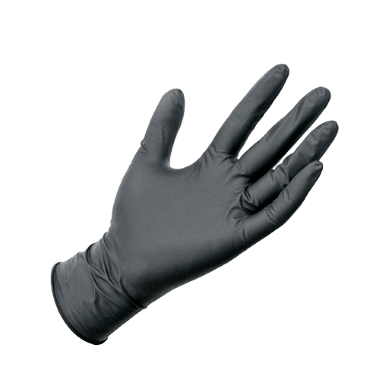
Polyisoprene
Polyisoprene surgical gloves offer a high level of protection and exceptional elasticity. They are similar in properties to latex gloves, which makes them an ideal alternative for individuals with latex allergies or sensitivities. While polyisoprene gloves are slightly more permeable than latex, they still provide comparable resistance to punctures. Although they are the most expensive glove material, their benefits make them a valuable option for individuals with latex allergies who require a suitable alternative.
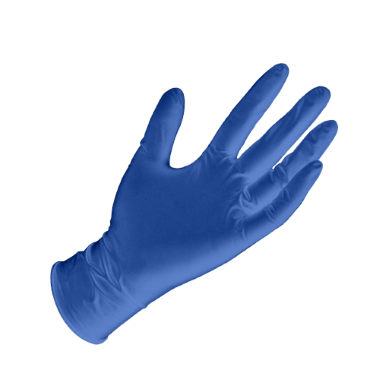
Powdered
Powdered gloves are often made with cornstarch or a similar powder. This powder coating on the inside of the glove helps reduce friction, making the glove easier to put on and take off.
The powder also helps absorb moisture and keep your hands dry. It should be noted that there are some potential drawbacks to powdered gloves, such as the risk of allergic reactions or the possibility of powder contamination.
Powder-Free
Powder-Free gloves are gloves that do not have a layer of powder on the inside. This style of surgical glove has a lower risk of allergic reactions and a lower risk of contamination.
They are more versatile and eco-friendly, but they can be more difficult to put on and take off compared to powdered gloves.
Micro-Rough
Micro-Rough surgical gloves feature micro-textured fingertips and a matte finish, enhancing grip control while maintaining tactile sensitivity.
With a non-slip grip, micro-rough surgical gloves ensure reliable performance even in wet or oily environments. They are particularly well-suited for tasks that require precise handling and a secure grip, such as medical procedures and laboratory work that demand accuracy.

Smooth
Smooth surgical gloves provide a consistently smooth surface across the entire hand of the glove and do not have textured fingertips.
Smooth examination gloves offer a comfortable fit and are easy to don and doff. They are commonly used across many types of industries and sectors, including both medical and non-medical applications.

Why are we a trusted Surgical Gloves manufacturer?
AdvaCare Pharma is a leading global manufacturer of Surgical Gloves and other PPE medical disposables specific for surgical procedures. Each of our products is accompanied by a comprehensive STED dossier, instilling confidence in our partners and distributors that our medical supplies consistently meet the highest standards of quality.
Drawing upon over two decades of industry experience, we have developed a distribution network that extends to 65 markets across the globe. Our business model is focused on creating a strong partnership with our distributors, and our professional team offers unbeatable assistance throughout the entire process - from supply chain coordination to registration support.
Uses
What are Surgical Gloves used for?
Surgical Gloves serve as indispensable personal protective equipment (PPE) in the realm of medical practices, finding their primary utility in creating a robust barrier between the hands of healthcare professionals and potential contaminants during various medical procedures and examinations.
These gloves safeguard both the healthcare providers and the patients they serve. They act as a defence, preventing direct skin contact with bodily fluids, blood, and other potentially infectious or harmful substances. The significance of Surgical Gloves extends across various healthcare settings, protecting the safety and well-being of patients and healthcare workers alike.
How are Surgical Gloves worn?
Using Surgical Gloves as instructed is paramount to preserve the sterility required in medical environments and to mitigate the risk of cross-contamination. Healthcare professionals must check that these gloves fit securely, enveloping the entire hand and extending over the wrist. The meticulous donning of gloves is a prerequisite before any patient interaction or exposure to potentially contaminated surfaces.
Equally relevant is the correct doffing procedure, as gloves must be carefully removed and replaced between patient encounters. These meticulous practices are foundational in minimizing the potential transmission of infections and preserving the integrity of the healthcare environment.
Are there any storage recommendations for Surgical Gloves?
The storage of unused Surgical Gloves demands particular attention to retain their efficacy and sterility. These gloves should be securely stored in their original packaging or within a designated container, strategically shielded from any sources of contamination.
The storage area should meet stringent cleanliness standards, devoid of direct sunlight exposure and shielded from any heat sources. Checking that Surgical Gloves remain in a pristine state is required to guarantee their efficacy when called upon in the clinical setting.
How should used Surgical Gloves be disposed of?
After each use, healthcare professionals should adhere to established disposal protocols:
- The process begins with the careful removal of one glove by gently grasping the cuff and pulling it off, subsequently turning it inside out during the removal process.
- The removed glove should be held within the gloved hand while the other glove is removed following the same meticulous procedure.
- These used gloves should then be placed within the appropriate waste bin, following the precise guidelines and regulations governing the disposal of medical waste.
FAQs
Which material of Surgical Gloves should be used?
The choice of material is dependent on factors like allergies, sensitivity, and the specific procedure. Latex gloves are a popular choice due to their excellent fit, comfort, and tactile sensitivity, but they can be problematic for individuals with latex allergies. Nitrile surgical gloves are a suitable alternative for individuals with latex allergies or sensitivities.
Should powdered or powder-free Surgical Gloves be used?
Powder-free gloves lower the risk of allergic reactions and reduce the spread of powder particles in the operating room environment. Powdered gloves help to reduce friction within the glove, which makes it easier to put on and take off. The powder can also enhance tactile sensitivity and absorb moisture and perspiration.
Which texture of Surgical Gloves should be used?
Smooth surgical gloves provide a natural feel and excellent sensitivity, which can make them suitable for delicate procedures. Textured micro-rough fingertips offer enhanced grip and control, which can be ideal for procedures needing a firm grasp or if dealing with slippery objects or fluids.
What distinguishes your Surgical Gloves from other brands on the market?
- Superior Barrier Protection: Our surgical gloves provide exceptional barrier protection against pathogens, chemicals, and contaminants, ensuring the safety of healthcare professionals and patients during medical procedures.
- Comfortable Fit: Designed for comfort, our gloves are anatomically shaped and feature a textured surface for enhanced grip and dexterity, allowing for precise movements and tasks without sacrificing comfort.
- Excellent Sensitivity: Made from high-quality latex or nitrile material, our gloves offer excellent tactile sensitivity, allowing healthcare professionals to feel and manipulate small objects with ease during procedures.
- Durability and Strength: Known for their durability and strength, our surgical gloves offer resistance to punctures, tears, and abrasions, ensuring long-lasting performance in demanding medical environments.
Are there options to tailor the material and specifications of your Surgical Gloves to suit my requirements?
We provide options to customize the material and other specifications of surgical gloves to meet the strict requirements of surgeons. Leveraging our agile manufacturing techniques, we can enhance production capability to offer a broader spectrum of specifications, ensuring suitability for diverse market needs.
What quality control processes do you implement for your Surgical Gloves?
We maintain stringent quality assurance protocols throughout the entire lifecycle of our medical devices, incorporating certifications such as CE, ISO, and/or USFDA to uphold the utmost standards of quality and safety.
References
Effect of Surgical Gloves on Tactile Sensibility
This study evaluates the impact of surgical gloves on tactile sensibility, particularly in the context of surgical practice. It discusses the negative effect of surgical gloves on the sensibility of the hand and highlights significant differences based on glove characteristics and wearing habits. The study addresses the presumed disadvantages of glove use, such as diminished manual dexterity and tactile sensibility, and aims to provide insights into the effect of different glove types and wearing habits on tactile performance.
Touch Sensitivity with Sterile Standard Surgical Gloves
This study investigates touch sensitivity when wearing sterile standard surgical gloves. It specifically focuses on the absence of difference in touch sensitivity in the index and middle fingers of the dominant hand when wearing these gloves. The research provides valuable insights into the impact of sterile standard surgical gloves on touch sensitivity, which is crucial for assessing their suitability for surgical procedures.
Systematic Review on the Use of Surgical Gloves
A Cochrane Review published in 2009 is referenced, which investigated whether additional glove protection reduces the number of surgical site infections (SSI) or bloodborne infections in patients or healthcare workers. While the specific findings of the review are not detailed, it represents a comprehensive assessment of the use of surgical gloves and their potential impact on infection prevention.

You might be interested in...
Why AdvaCare Pharma?
As an industry leader, we are aware of our responsibility to provide affordable and sustainable solutions to improve healthcare worldwide.
